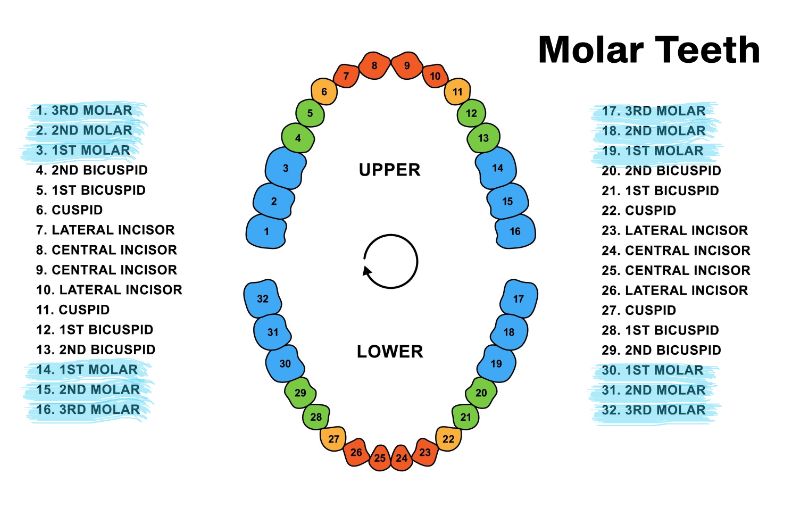Molar teeth play a crucial role in our dental health, supporting various functions and contributing to our overall well-being. Here, we explore the different molars, their functions and the dental problems that can affect these teeth. We’ll therefore also look at how dentists treat these issues.
First Molar Teeth
- Positioned at the back of the mouth, the first molars help us to grind and chew food.
- They have a broad surface area with multiple cusps to facilitate the efficient breakdown of food.
Second Molars
- The second molars (see image) continue the process of grinding and chewing.
- These teeth assist in breaking down food even further before swallowing.
Third Molars (Wisdom Teeth)
- Wisdom teeth are the last set of molars to erupt, usually during the late teens or early twenties.
- Their function is less prominent and therefore not everyone develops or has enough space for wisdom teeth.
- Wisdom tooth extraction is a very common procedure and you can find out more about it HERE.
Common Problems with Molar Teeth:
- Tooth Decay: Molar teeth are prone to tooth decay due to their location and intricate surface anatomy. Poor oral hygiene, high sugar intake, and bacterial plaque contribute to decay.
- Dental Abscess: An infected molar can lead to a dental abscess, causing severe pain, swelling, and fever. Abscesses occur when the dental pulp becomes infected due to untreated decay or trauma.
- Impacted Wisdom Teeth: Wisdom teeth can become impacted, causing pain, swelling, and difficulty in opening the mouth. Lack of space in the jaw can result in partially or fully impacted wisdom teeth.
Treatment for Molar Problems
Dental Fillings:
- Dentists use fillings to restore the teeth affected by tooth decay, preventing further damage.
- The decayed portion is removed, and a suitable filling material, such as composite resin, is applied.
Root Canal Treatment:
- For severe tooth decay or dental abscesses, a root canal may be necessary.
- The infected pulp is removed, and the root canals are cleaned, filled, and sealed to save the tooth.
Tooth Extraction:
- Impacted or severely damaged molars may require extraction to alleviate pain and prevent complications.
- Dentists perform extractions under local anaesthesia, thereby ensuring patient comfort during the procedure.
Orthodontic Treatment:
- Orthodontic intervention is usually advisable in cases of crowded wisdom teeth that cause misalignment or discomfort.
- Orthodontists can assess the situation and recommend appropriate treatment, which may include extraction or orthodontic appliances.
Summary
- Molar teeth serve vital functions in our ability to chew and process food effectively.
- Understanding the different types, their functions, and common dental problems associated with them helps us appreciate the importance of maintaining good oral hygiene.
- Regular dental check-ups and prompt treatment by qualified dentists ensure optimal dental health and overall well-being.
CLINICS FOR WISDOM TEETH EXTRACTION:
Abu Dhabi





